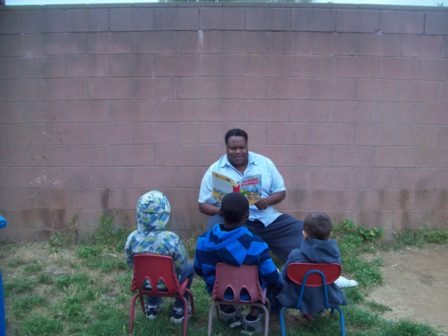What Now? Clando Can Read
If you can read this, you’re ‘way ahead of the thousands of adults and children in our town who can’t. Because they can’t, they either fake their way through their lives, or settle for minimum achievement – minimum opportunities; they never experience the pined-for successes they could actually achieve – if they could read.
With his own grit and determination, and the support of the San Diego Council on Literacy, Clando Brownlee beat all the odds.
Overcoming, drugs, petty criminality and illiteracy, Clando today – he is 51 – is a productive – read that “successful” businessman, community activist and family man. One, I’d add, with a major dose of passion, a warm veneer of charm. We talked:
LW: You were diagnosed as dyslexic at 19. How did you manage to get along until then?
CB: I used skills like sports, dancing, singing! I had lots of friends around me; I hid my disability. If I got cornered, I would pretend to be sleepy or claim a headache. But it eventually began to be noticed, that I would never read or write anything. I actually lived a life of covering up fears and anxiety.
LW: How did dyslexia affect your ability – not only to read, but to function in all areas?
CB: I couldn’t read – for starters. I couldn’t drive (legally!), nor plan trips, give greeting cards, fill out an application. I was always on pins and needles, working overtime to try to mask my dysfunction. I once asked a girl for her phone number; she included her address but I couldn’t read the street name. I was always facing situations like that.
LW: How long was it before you could consider yourself functionally literate? What was the most important help you had?
CB: I would say I started becoming functionally literate about six years after my diagnosis. My sister, Deborah, helped me sound out words, and made me lists of the words I couldn’t read – they would be my ‘homework.” I understood basic math, though, and have an above average mechanical aptitude. Those helped me do well with tools and machines, so I actually could get and keep a decent job, but I knew I could do better one day.
I saw a flier from ‘San Diego Read,’ a program affiliated with the S.D. Literacy Council. It said I could be tutored through the organization. They turned out to be the nicest, kindest people I’d met in quite a awhile. I had three tutors, but the most memorable was John Yevttich, an engineer. We clicked on technical issues, and he was also knowledgeable about stocks and bonds, one of my greatest interests.
LW: Clearly, today, you are a reader, and a passionate contributor to our community. Your resume is impressive; give us some sense of the issues most important to you?
 CB: First, my faith (note: Clando describes himself as a “new testament believer”). Then, the sustainability of the planet, and the community; they all tie together. I truly fill a seemingly divine call to Environmental Stewardship. For the last nine years I’ve been preaching and teaching reduce, reuse, recycle; for the last two years I’ve focused on electronic recycling, or E-waste. Through our E-waste events we’ve diverted hundreds, thousands of pounds of toxicants away from the local landfills – and the best part is that the events serve as fundraisers for our charities, such as Chelsea’s Light Foundation and the San Diego Children’s Coalition. On May 5 I’ll be hosting a E-waste fundraiser for the San Diego Council on Literacy.
CB: First, my faith (note: Clando describes himself as a “new testament believer”). Then, the sustainability of the planet, and the community; they all tie together. I truly fill a seemingly divine call to Environmental Stewardship. For the last nine years I’ve been preaching and teaching reduce, reuse, recycle; for the last two years I’ve focused on electronic recycling, or E-waste. Through our E-waste events we’ve diverted hundreds, thousands of pounds of toxicants away from the local landfills – and the best part is that the events serve as fundraisers for our charities, such as Chelsea’s Light Foundation and the San Diego Children’s Coalition. On May 5 I’ll be hosting a E-waste fundraiser for the San Diego Council on Literacy.
LW: You and your wife own and operate Shirley’s Tender Loving Daycare, for children – but that’s hardly all you do.
CB: Well, I’m pretty proud of launching The San Diego Brotherhood Lions Club, the first African-American club in the State. I also co-formed the San Diego Children’s Day Celebration, and I’m the founder and CEO of Kool Climate Kids. I was also thrilled when Mayor Ron Morison signed a proclamation honoring our California Recycliing Days Initiative.
LW: Eat. Drink.Read. A Culinary Event for Literacy is Wednesday, May 16, and I know you’ll be there. We expect a dozen wonderful Chefs, food, drink – but you’ll be the inspiration for focusing our attention on the 440,000 adults and children here who can’t read. Give us a preview of what you’ll tell us.
CB: We all have choices. And what we do with those really helps determine our future. It took me a long time to make the right ones; I was always apprehensive, let down, embarrassed – all of that and more! I’ll tell everyone what I finally know: push past obstacles, take chances, make the choices that ensure a better life.
Category: Life Style







